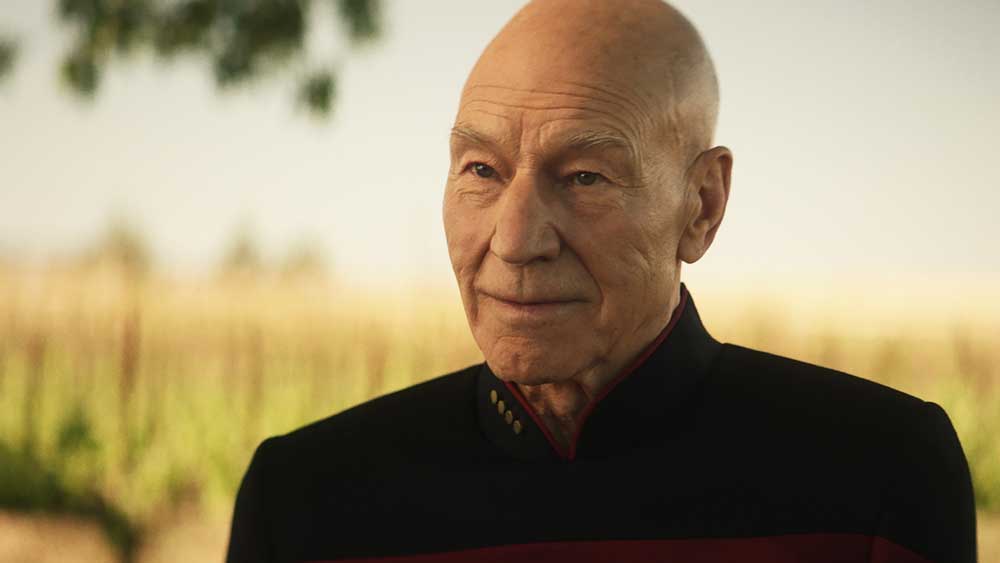Why we still ‘boldly go’ with ‘Star Trek’
Published 2:15 pm Wednesday, August 4, 2021

- Patrick Stewart stars in “Star Trek: Picard” (2020-present) on Paramount+.
There have been many long-running television shows and franchises, but few come as close to being a cultural touchstone as Gene Roddenberry’s sci-fi adventure of “Star Trek.” The original series premiered in 1965 on NBC, bringing us “space the final frontier” and with it the enduring legacy of shows and films that continue to inspire and entertain today.
The voyages
Set in the 23rd century and surrounding the crew of the USS Enterprise as it embarked on a five-year mission to explore strange new worlds, “Star Trek: The Original Series” (as it is now called) started out strong with audiences, but network executives were less sure about it.
Produced by Desilu Productions — whose co-founder, Lucille Ball, Trekkies can thank for greenlighting their favorite show — and picked up by NBC, the pilot episode was less than what the network wanted. While they disliked the episode, they liked the world Roddenberry had built, so they had the production make a second pilot, which was accepted, and the rest, as they say, is history. (The original pilot, “The Cage,” has since been restored as the first episode on streaming platforms).
The show followed a pretty basic “monster of the week” episodic structure with the crew encountering a different alien race or planet each episode but lacked any major story arcs over several episodes. But what it also did was subtly imbue allegories with aspects of real-life events and morality tales, something that not only all good sci-fi does but something that would only grow stronger as the universe of the show expanded in later years.
“Star Trek” had some very vocal fans who saved it from getting the ax in its second season after a letter-writing campaign, but they couldn’t save it after Roddenberry left before its third season and NBC slashed its budget, scheduled it for a terrible Friday night time slot and overall ratings plummeted.
But those 79 episodes led to a whole world of possibilities, including an animated series in 1973-74 and subsequent films that featured the original cast from 1979 through 1991.
New life
Paramount was so buoyed by the success of the “Star Trek” films that they ventured into the land of syndicated television again with a whole new Enterprise and a whole new crew. This new generation of Star Trek was often more cerebral and had more overarching plotlines that drove the series beyond the model of the original series.
With more thought-provoking episodes, “Star Trek: The Next Generation” still holds up — with a few notable exceptions — and the crew captained by Jean-Luc Picard (Patrick Stewart) is as revered as the original cast.
The series ran for seven seasons before immediately being jettisoned to the silver screen with its own series of films, starting with “Star Trek: Generations” in 1994, and most recently with the series “Picard” on Paramount+.
Overlapping with the TNG series and films, Paramount premiered more shows set in the same universe: “Deep Space Nine” followed by “Voyager.” Both focused on different ships in the Federation, and both lasted for seven seasons.
The world was saturated with “Star Trek” by the late 90s. But ever hopeful with its successful franchise, Paramount pushed for yet another series, this time a prequel called “Enterprise,” which focused on the crew of very first USS Enterprise helmed by Captain Archer (Scott Bakula), on UPN.
Like the original series, “Enterprise,” was threatened with cancellation, saved by fans’ letter-writing campaigns, moved to a bad time slot, followed by cancellation after the fourth season in 2005. This coupled with the poor box office of the Next Generation film “Nemesis” in 2002, left the future of Star Trek adrift.
Boldly going
In 2007 Paramount sought to revive the franchise and gave writers Roberto Orci and Alex Kurtzman, together with producer J.J. Abrams, carte blanche to reinvent the whole universe. So they blew it up with 2009’s “Star Trek,” setting it in the alternate “Kelvin” timeline, giving them freedom from canon to develop the stories as they saw fit.
The first film was a critical and financial success, and spun out two sequels, though both were diminishing returns on the first.
With a renewed popular interest, CBS (which had split from it and Paramount’s parent company, Viacom, in 2005) looked back toward television to give the franchise what it needed.
To help bolster their premium streaming app, they produced with Kurtzman “Star Trek: Discovery” as a CBS All Access (now called Paramount+) exclusive, and kicked off the official Star Trek Universe (similar to the Marvel Cinematic Universe). “Discovery” coupled with “Picard” as well as two animated series, “Star Trek: Lower Decks” and the upcoming “Star Trek Prodigy,” are keeping the franchise fresh and accessible to fans and newcomers to the universe.








